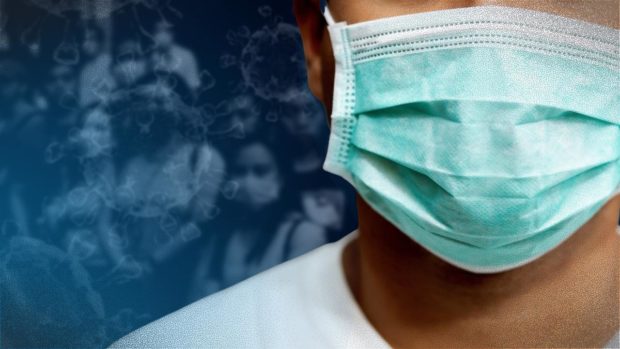
Face mask. INQUIRER FILE PHOTO
MANILA, Philippines —Masks are optional in uncrowded, well-ventilated areas, but an infectious disease specialist recommended that they be worn even outside.
The reason is that the number of confirmed cases of COVID-19 is rising, said Dr. Rontgene Solante on Monday.
Due to greater mobility, Solante has seen that current COVID-19 cases involve multiple members of the same family.
Solante was asked during the Laging Handa briefing what he could say about President Ferdinand Marcos Jr.’s Executive Order No. 3, which did not require face masks in uncrowded outdoor situations.
“Well ang ibig sabihin natin d’yan hindi natin pa rin ine-encourage na magtanggal pa rin tayo ng face mask ano, kaya palagi nating reminding everyone na mas que sinasabi na voluntary o optional, mas maigi pa rin na magsuot tayo ng face mask, especially kung di tayo sigurado sa sarili natin,” Solante said.
(Well, that only means that we don’t encourage the removal of face masks, that’s why we are reminding everyone that even if it is voluntary or optional, it would be better to wear masks, especially if we are not sure about our safety.)
“Especially when we are [part of] the vulnerable population, or mayroon tayong mga comorbidities, o ‘yong mga matatanda, o mayroong tayong inuuwian sa bahay na mas pwede nating mahawaan ‘no, kasi ngayon ang taas ng household transmission ng COVID. Makikita natin pamilya-pamilya ang nagkakasakit tapos ‘yong mga matatanda ang napupunta sa hospital,” he noted.
(Especially if we are elderly, have multiple medical conditions, or live in a household where the infection is a real possibility. As evidenced by our observations, we know that the disease spreads rapidly through households. Families are infected, and the sickest patients tend to be the oldest ones.)
The majority of COVID-19 hospital hospitalizations in recent months have involved patients aged 60 and up, according to Solante. However, he emphasized that most hospitalized patients suffer from multiple comorbidities or conditions made worse by COVID-19.
Some of the comorbidities among COVID patients are inflammation in major organs such as the lungs, heart, liver, and kidney.
“A lot of them have two or even three comorbidities. And itong mga na-admit ngayon ay na-admit [And those admitted now were admitted] not necessarily because of pneumonia, but because of their comorbidities,” he explained.
“Pero mayroon ding mangilan-ngilan na ang talagang presentation nila ay pneumonia, nahihirapang huminga, ‘yong ibang nastroke, nadudugo yung brain or ‘yong hemorrhage, ‘yong iba naman severe infection sa abdomen, and ‘yong iba atake sa puso, so I mean the comorbidities are the ones that are dominating now among these COVID patients,” he said.
(Some patients are admitted because they have pneumonia and are having trouble breathing; others have experienced strokes or brain hemorrhages; others have developed life-threatening stomach infections or heart attacks. Consequently, comorbidities are currently the dominant factor in the care of COVID patients.)
Solante shared his observations after stressing that the World Health Organization (WHO) proclamation that the COVID-19 pandemic is ending cannot apply to the Philippines, because infections are still high and the death rate in the country due to the disease is ranked fifth globally.
READ: Pandemic end not yet applicable to PH as expert cites high COVID death rates
The Department of Health (DOH) made the same remarks, saying that the end of the COVID-19 pandemic would be within grasp only if targets in terms of vaccinations are met.
READ: DOH: End to pandemic only if vax targets met
On September 9, DOH officer-in-charge Maria Rosario Vergeire said that Metro Manila might face 1,200 to approximately 5,300 COVID-19 infections per day if the booster update remains slow and if people continue to be mobile. Then just last Friday, the Department of Health (DOH) said that the positivity rate in Metro Manila rose from 13.2 percent two weeks ago to 16.4 percent last week.
READ: DOH exec: Metro Manila’s daily COVID cases may reach 1,200 – 5,300 by Oct
Solante echoed DOH’s remarks, saying that wearing face masks and ensuring that the eligible population gets booster shots would contribute to improving situations.
During President Marcos’ state visit to Singapore — a country that has already allowed the non-wearing of face masks except in high-risk settings like hospitals and public transportation — the Department of Tourism (DOT) initially mulled the relaxation of masking protocols.
The DOT said this based on the observation that countries with relaxed masking protocols get more tourist arrivals. DOH initially contested the suggestion, but eventually sought a compromise. With reports from Kristelle Anne Razon, INQUIRER.net trainee
RELATED STORY:
Face mask use now voluntary outdoors but…